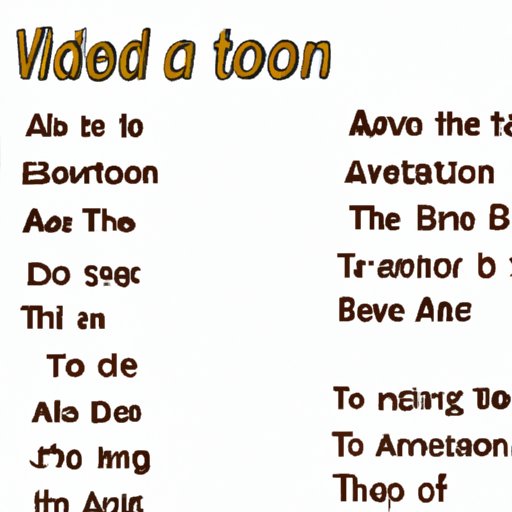Introduction
To be verbs are used in English language to express a state of being. They include words like “am,” “is,” “are,” “was,” “were,” and “be.” While these words are necessary for basic communication, they can weaken the quality of writing. This is because they often lack specificity and make sentences sound dull or vague. Therefore, it is important to avoid using To Be Verbs as much as possible in order to improve the quality of writing.
Substitute with Action Verbs
The first step to getting rid of To Be Verbs is to identify them. When reading through a piece of writing, look out for words like “is,” “are,” “was,” and “were.” These words indicate that To Be Verbs are being used. Once they have been identified, they should be replaced with action verbs which provide more specific meaning and make sentences more interesting.
For example, instead of saying “it was raining,” you could say “rain poured down.” Other examples of action verbs include “walked,” “spoke,” “thought,” “jumped,” “ran,” “listened,” and “wrote.” Using action verbs instead of To Be Verbs will make the writing more vivid and engaging.
Use Active Voice
Another way to get rid of To Be Verbs is to use the active voice. The active voice is when the subject of the sentence is performing the action. For example, “John wrote a letter” is an example of the active voice as John is performing the action of writing. On the other hand, “A letter was written by John” is an example of the passive voice as John is not actively performing the action.
When rewriting sentences in the active voice, it is important to focus on the subject of the sentence and make sure that it is performing the action. This will help to reduce the number of To Be Verbs used as well as make sentences more concise and direct.
Break Up Long Sentences
Another effective way of reducing the number of To Be Verbs is to break up long sentences. Long sentences tend to be filled with To Be Verbs and can become confusing for readers. Breaking up sentences into shorter ones can help to make them easier to understand and also reduce the number of To Be Verbs used.
For example, instead of saying “John was walking to the store when he saw a dog,” you could say “John walked to the store. He saw a dog along the way.” Breaking up the sentence into two shorter sentences makes it easier to read and eliminates the need for the To Be Verb “was.”
Focus on the Nouns
Another way to reduce the number of To Be Verbs is to focus on the nouns in a sentence. Nouns are the people, places, things and ideas that are being discussed. By emphasizing the nouns, it will help to reduce the number of To Be Verbs used. For example, instead of saying “The book was written by John,” you could say “John wrote the book.” Emphasizing the noun “book” helps to eliminate the need for the To Be Verb “was.”
Re-word Sentences
Finally, another way to get rid of To Be Verbs is to re-word sentences. By re-wording sentences, it will help to reduce the number of To Be Verbs used and make the writing more concise and direct. For example, instead of saying “The cat was sleeping on the bed,” you could say “The cat snoozed on the bed.” Re-wording the sentence helps to eliminate the need for the To Be Verb “was.”
Conclusion
In conclusion, getting rid of To Be Verbs is an effective way to improve the quality of writing. It is important to substitute with action verbs, rewrite sentences in the active voice, break up long sentences and focus on the nouns. Additionally, re-wording sentences can also help to reduce the number of To Be Verbs used. By following these tips, it will help to make writing more vivid, engaging and concise.
Final Thoughts
Getting rid of To Be Verbs can be difficult, but with practice, it is possible to improve your writing. Making a conscious effort to avoid using To Be Verbs will help to make your writing more engaging and enjoyable to read.
(Note: Is this article not meeting your expectations? Do you have knowledge or insights to share? Unlock new opportunities and expand your reach by joining our authors team. Click Registration to join us and share your expertise with our readers.)
